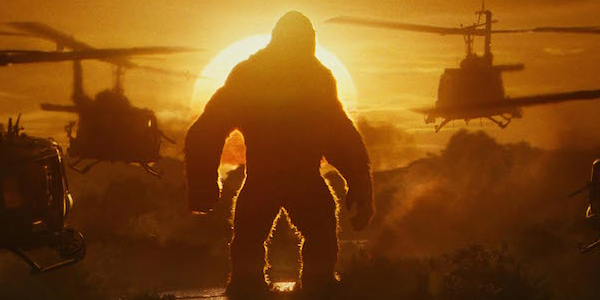One Change Kong: Skull Island Made To Its Script That Resulted In A Totally Different Movie

The Vietnam War is a very important element of director Jordan Vogt-Roberts' Kong: Skull Island. Not only does the conflict continue to have a lasting impact on many of the blockbuster's main characters within the story, but the films of the same era clearly has a massive effect on the movie's look and feel. Within the King Kong franchise, it's arguably the element that most defines it -- which is why it's so surprising that the earliest drafts of the script were set back in 1917.
I learned about the evolution of Kong: Skull Island's script when I sat down for a one-on-one interview with Jordan Vogt-Roberts during the movie's recent Los Angeles press day. According to the director, the original script that was being developed by Legendary was set during World War I -- but when he became involved, he wound up somewhat serving as a wrench in the gears. Vogt-Roberts explained,
The first script that I had, which was a great script by Max Borenstein who is an incredible writer, it took place in 1917. And so when they came to me and said, 'We're making a new King Kong movie,' I said, 'Great! I love monsters. I love King Kong. But why? Why are we doing this? Why do we need a new King Kong movie?' And they sent me that script, and I read it. And I was just like this is a super cool script, but it's not for me.
Given that Jordan Vogt-Roberts is a young filmmaker with only one independent title on his record (the excellent coming-of-age story Kings of Summer), many might see this as a bold move. To the credit of the studios, however, they decided to not just accept the rejection, but instead question it:
Warner Bros. and Legendary being a very cool company said, 'Well, what version would you make? What version would you be interested in?' And that's when I went away, and the idea of choppers in Napalm and Hendrix's playing and Kong silhouetted by a fiery sun. And somehow the idea of the mashup of Apocalypse Now and Kong came to my brain, and the idea of a Vietnam War movie with monsters came to my brain because I was like I've never seen that. That feels fresh to me.
Kong: Skull Island isn't the first in the long-existing franchise to be set in the 1970s, as the 1976 remake directed by John Guillermin was set in that decade, but it is certainly the first to take advantage of the Vietnam War aesthetic. This is especially important in differentiating the new blockbuster from the original 1930s-set take, which Peter Jackson already brought back in a big way in 2005.

Though Jordan Vogt-Roberts was clearly enticed at the possibilities of a 1970s set aesthetic for a King Kong movie, he also recognized the many elements of the era that actually perfectly fit with the movie he wanted to make. It wasn't anything as big as X-Men: First Class' integration of the Cuban Missile Crisis, but certain true life events did wind up enhancing the reality of the story he wanted to tell. Said the director,
That became a jumping off point for a million thematic reasons, not just in terms of plot ideas of like 'Oh, we were putting satellites in the sky and looking down at the Earth for the first time.' It's credible that we would find a new place or a new island. But there were so many thematic things that went along with that about the black mirror that is our society now to then with racial riots and sexual revolutions and losing wars and distrust of the government. And I love the idea of taking characters, much like they are in our current world, caught between the old guard and the new guard and taking these characters who are disillusioned by the war and what was happening at the time and thrusting them into this world.
This pitch inspired the studio to do a complete re-write on the script, and while there exists some similarities between the finished film and Max Borenstein's original script (such as the fact that Kong never went back to civilization), the whole thing was changed. Borenstein, who previously wrote the Godzilla reboot for Legendary and Warner Bros., was brought back in to work with Vogt-Roberts, and together they crafted the movie that audiences will soon be seeing in theaters.
Very soon, in fact. Kong: Skull Island is arriving in theaters this Friday, March 10th -- and you should be sure to keep your eyes peeled here on CinemaBlend, as we have plenty more from my interview with Jordan Vogt-Roberts coming your way!
Your Daily Blend of Entertainment News

Eric Eisenberg is the Assistant Managing Editor at CinemaBlend. After graduating Boston University and earning a bachelor’s degree in journalism, he took a part-time job as a staff writer for CinemaBlend, and after six months was offered the opportunity to move to Los Angeles and take on a newly created West Coast Editor position. Over a decade later, he's continuing to advance his interests and expertise. In addition to conducting filmmaker interviews and contributing to the news and feature content of the site, Eric also oversees the Movie Reviews section, writes the the weekend box office report (published Sundays), and is the site's resident Stephen King expert. He has two King-related columns.
